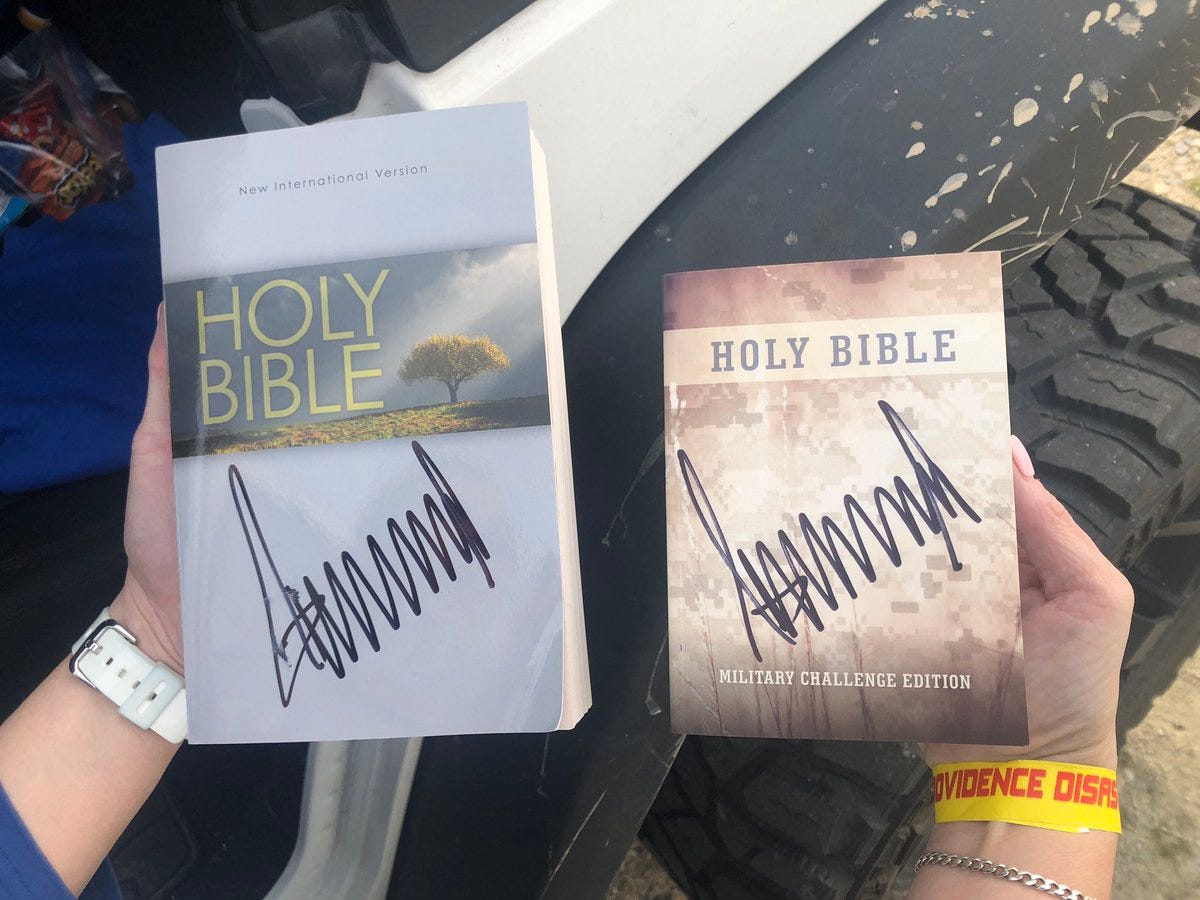
I haven’t been a “born-again believer” since I was about 15 years old. Over the last three decades, I have wrestled with my faith, with my violent religious upbringing, and with my commitment to Jesus Christ’s Golden Rule. I think of myself these days as a “secular Christian,” similar to how some Jews think of themselves as Jewish but not “observant.” (Strictly speaking, I’m a Unitarian Universalist, but UUs are a generous bunch.) So I was surprised by the hot emotions I felt when I read about Donald Trump signing Bibles during a trip last week to survey storm damage in Alabama.
I felt the fury of the righteous men who preached on the hot Sunday nights of my childhood, who railed against false gods and false prophets, who demanded to know one thing: Was I ready? Did I accept His only begotten Son, who died on the Cross so I might be forgiven, as my lord and savior? Are you ready? they asked. It’s time.
I have accepted Christ as my savior. More than once, actually, each time with the same empirical result. But that’s not my point. My point is that I haven’t genuinely believed in about 30 years, yet here I am feeling fire and brimstone at the sight of Trump signing his name to the Holy Bible. What’s more, these so-called evangelical Christians, who are his mightiest supporters, were not only OK with idolatry; they cheered it! “The crowd roared with applause after Mr. Trump signed the Bible,” the Times reported.
Make no mistake. This was idolatry.
The first of the 10 Commandments: “Thou shalt have no other gods before me.” “Me” being God. That point is made clear when, in Exodus, Moses descends the mountain to see the Hebrews idolizing the Golden Calf. Moses ends the spectacle by smashing the stone tablets. Moral: The righteous do not follow false prophets. The righteous do not worship idols. The righteous do not ask pagan Caesar to autograph the Word of God.
Because signing the Bible is so clearly a goddamn abomination, Republican operatives tried naturally to obscure the fact. “This is Alabama, and although not overly common, it is also not rare for citizens to give politicians their Bibles to sign,” a Republican consultant told the Times. “To read into this any sort of ‘We believe Trump is God’ or anything like that would be unfair. It’s just something that on occasion happens in the South.” Actually, that’s exactly how you should read it. It’s fair to accuse them of believing “Trump is God.” Just because it’s done in Alabama doesn’t make it holy.
We can expect despicable behavior from operatives. But what about a man of belief who takes the Word literally. Surely, he would know better, right? Wrong. The Times: “Robert Jeffress, pastor of First Baptist Dallas and one of Mr. Trump’s prominent evangelical supporters, said it was ‘very appropriate’ for a president to sign a Bible, adding that people ask him to sign their Bibles ‘all the time’” (my italics).
So, to recap: It’s OK for Trump to profane the Bible. It’s OK for “Christians” to cheer him on. It’s OK for Republican operatives to lie about the fact that yup, that’s an abomination. It’s OK for religious leaders to not only participate in such sacrilege but sell their souls to defend the president. But there’s more. It seems also to be A-OK to turn a profit. After Trump signed a Bible in 2016, it was sold for $3,500 on eBay.
Why would I feel so much anger over something I don’t believe in anymore? Well, it’s complicated. First, just because I don’t believe in the “magic words” of Protestant Christianity doesn’t mean I don’t care about the faith. I admire genuine believers of all traditions, not just Christians. If I’m honest with you, I have to admit I envy them.
Second, I care about the teachings of Jesus. When asked for the most important of Moses’ laws, Christ said there were two of equal importance: love God with all your heart and soul, and love your neighbor just as much. This, to me, is foundationally liberal, as it demands that we set aside the natural habit of viewing each other in group form in order to see within individuals a common and sacred humanity.
Yes, Jesus called this the “Kingdom of Heaven,” but I don’t think he meant that literally, and even if he did, so what? Anything that minimizes humankind’s tendency toward socially acceptable sadism is something, I think, that brings us closer to heaven. If, in order to do that, people must believe that Christ really rose from the dead, and that he’s going to save them from Hell, who am I to say otherwise?
Third, Trump is everything Jesus stood against, and yet these “Christians” not only lionize him enough to violate a taboo with insouciance, they have the gall to accuse liberals, even people like me who left the community, of not getting it.
No, we get it. With the same hand Trump used to sign hush-money payments to a porn actress with whom he had extra-marital sex, the president signed their Bibles. Motherogod, as the old folks used to say. This is not the Christianity of Jesus Christ.
This is the Christianity of tribe.
—John Stoehr

A very special local event!
The Editorial Board is partnering with the New Haven Review and the Institute Library to bring writers and thinkers together to explore key issues in civic and political life.
We’re calling it Politics in Plain English.
Our second event is titled “What’s Up with Liberalism and the Left?” Batya Ungar Sargon, opinion editor of the Jewish Daily Forward, will join Joshua Holland, contributing editor for The Nation, to examine liberal-leftism in the era of Donald Trump. I’ll be co-hosting. I hope you can come. I’d love to meet in person!
Date: Tuesday, March 12.
Time: 7:30 p.m.
Location: 847 Chapel St., New Haven, Conn.
Cost: $10 suggested donation.


